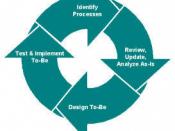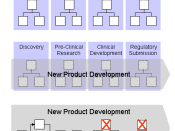In order for an organization to be successful one must have a plan in place to ensure total quality in the goods they produce, in the service that's provided, and in the support that's given to its consumer's. And to make sure that the company's information is protected one must establish a system that can manage the information as an asset. In this paper researched five articles detailing best practices in ensuring quality, speed, and flexibility in organization. Those practices are: Total quality management, mass customization, theory of constraints, kaizen (continuous improvement), and reengineering. I also researched five articles detailing best practices in managing information as an asset. Those practices are: knowledge management, innovation management, risk management, record management training, and document management. Along with providing a brief summary of each practice, I will be identify an organization using each practice, and I will then evaluate my own organization based on these practices and offer recommendations for converting my organization's existing practices to one or more of the practices found in the research.
Part A
Total quality management (TQM)
Total quality management (TQM) is the holistic approach that covers all aspects of an organization's activities. TQM strategy is defined as 'a set of quality management actions or critical factors that practiced by an organization for the achievement of excellent organizational performance. The quality of a product or service is dependent on all activities in the organization's supply chain. With TQM, the goal at each stage in the operational supply chain is to define and meet customer requirements in order to maximize customer satisfaction while maintaining cost control. TQM reorients managers toward involving people across departments in improving all aspects of the business.
Higher productivity, increased morale, reduced costs, and greater customer commitment are the most frequent advantages of TQM.



Flexibility in organization
this is a nice essay about the flexibility in organization
0 out of 0 people found this comment useful.